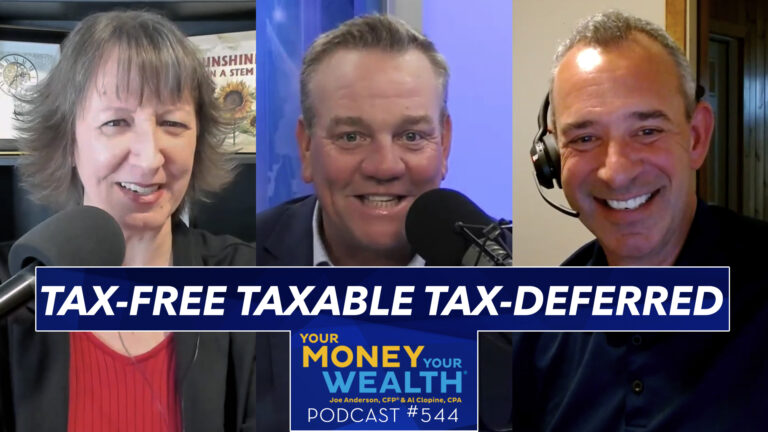Is the well-known trading adage, “sell in May and go away” actually good advice? Joe Anderson, CFP® and Big Al Clopine, CPA discuss this in YMYW podcast episode 34 before diving into retirement planning, sharing common IRA and Roth misconceptions and beneficiary blunders that could cost your family thousands. Original publish date May 28, 2016 (hour 2). Note that content may be outdated as rules and regulations have changed.
00:00 – Intro
02:26 – “You can contribute up to $5,500 (to an IRA); if you’re over 50 you get a $1,000 catch-up so $6,500”
04:01 – “If you’re in a low tax bracket you might not get that much benefit. You might as well do a Roth contribution so you forgo the tax benefit today but all future income, growth and principal are tax-free later. Here’s the caveat – you need earned income”
04:29 – “Earned income has to be salary or positive profits from your self-employment business”
09:01 – “If you don’t have an IRA already established and you try to do a direct rollover, you’re going to find yourself with some problems”
14:59 – “Did you know that you can use your spouse’s earned income if you’re not working to do a Roth or IRA contribution?”
16:03 – “A couple of other basics when it comes to the Roth: there is no required minimum distribution (RMD)”
23:08 – “These are retirement accounts. They’re for retirement; they shouldn’t really be used for other things”
28:52 – “We’re talking about IRAs, some mistakes you might be making with the overall retirement accounts; we talked about the basics – how much you can contribute, AGI limitations, penalties, RMDS. But one that people forget about is the beneficiary designation”
33:10 – “We encourage our clients and I’ll encourage you guys as well to be looking at your beneficiary statements on all IRAs, 401(k)s, 403(b)s every few years; make sure they’re up to date”
36:16 – “There is such thing as an IRA trust”
Listen to the YMYW podcast:

Amazon Music
AntennaPod
Anytime Player
Apple Podcasts
Audible
Castbox
Castro
Curiocaster
Fountain
Goodpods
iHeartRadio
iVoox
Luminary
Overcast
Player FM
Pocket Casts
Podbean
Podcast Addict
Podcast Index
Podcast Guru
Podcast Republic
Podchaser
Podfriend
PodHero
podStation
Podverse
Podvine
Radio Public
Rephonic
Sonnet
Spotify
Subscribe on Android
Subscribe by Email
RSS feed

YouTube Music
IMPORTANT DISCLOSURES:
Pure Financial Advisors is a registered investment advisor. This show does not intend to provide personalized investment advice through this broadcast and does not represent that the securities or services discussed are suitable for any investor. Investors are advised not to rely on any information contained in the broadcast in the process of making a full and informed investment decision.
• Investment Advisory and Financial Planning Services are offered through Pure Financial Advisors, LLC, a Registered Investment Advisor.
• Pure Financial Advisors LLC does not offer tax or legal advice. Consult with your tax advisor or attorney regarding specific situations.
• Opinions expressed are not intended as investment advice or to predict future performance.
• Past performance does not guarantee future results.
• Investing involves risk including the potential loss of principal. No investment strategy can guarantee a profit or protect against loss in periods of declining values.
• All information is believed to be from reliable sources; however, we make no representation as to its completeness or accuracy. As rules and regulations change, content may become outdated.
• Intended for educational purposes only and are not intended as individualized advice or a guarantee that you will achieve a desired result. Before implementing any strategies discussed you should consult your tax and financial advisors.
CFP® – The CERTIFIED FINANCIAL PLANNER™ certification is by the Certified Financial Planner Board of Standards, Inc. To attain the right to use the CFP® designation, an individual must satisfactorily fulfill education, experience and ethics requirements as well as pass a comprehensive exam. Thirty hours of continuing education is required every two years to maintain the designation.
AIF® – Accredited Investment Fiduciary designation is administered by the Center for Fiduciary Studies fi360. To receive the AIF Designation, an individual must meet prerequisite criteria, complete a training program, and pass a comprehensive examination. Six hours of continuing education is required annually to maintain the designation.
CPA – Certified Public Accountant is a license set by the American Institute of Certified Public Accountants and administered by the National Association of State Boards of Accountancy. Eligibility to sit for the Uniform CPA Exam is determined by individual State Boards of Accountancy. Typically, the requirement is a U.S. bachelor’s degree which includes a minimum number of qualifying credit hours in accounting and business administration with an additional one-year study. All CPA candidates must pass the Uniform CPA Examination to qualify for a CPA certificate and license (i.e., permit to practice) to practice public accounting. CPAs are required to take continuing education courses to renew their license, and most states require CPAs to complete an ethics course during every renewal period.









